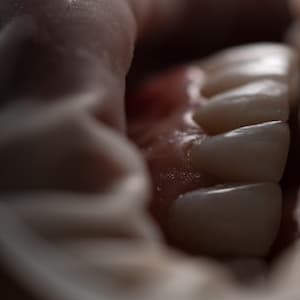jaw away: Idiom Meaning and Origin
What does ‘jaw away’ mean?
The idiom "jaw away" means to talk excessively or at length. It implies that someone is talking for a long time without stopping or without much purpose. It is an informal phrase typically used in casual conversations or informal settings.

Idiom Explorer
The idiom "interpret away" means to explain or rationalize something in a way that downplays or dismisses its importance or significance.
The idiom "hold one's jaw" means to remain silent or not speak, often in a situation where one has strong opinions or wants to share their thoughts. It implies control over one's words or emotions.
The idiom "have words" means to argue or have a heated discussion with someone.
The idiom "go to town on" means to do something with great enthusiasm or energy, often with a focus on doing it thoroughly or excessively.
The idiom "give someone an earful" means to speak angrily or in a strong and forceful manner to someone, usually in response to their actions or behavior.
The idiom "get wind in one's jaws" means to talk excessively or for a long time about something, often without substance or relevance.
The idiom *fool away* means to waste or squander something, usually time or an opportunity, by engaging in foolish or unproductive activities.
The idiom "flap one's gums" means to talk incessantly or to speak aimlessly without saying anything of substance. It implies that the person is talking too much without making any meaningful contribution to the conversation. This idiom is often used in a negative or dismissive manner, suggesting that the person is wasting time or just indulging in empty chatter.
The idiom "do the talking" means to express oneself or convey a message primarily through actions or behavior instead of words.
Decoding Conversational Volubility
Jaw away is a colloquial expression used in the United States to mean talking excessively or at length without considering the interest or involvement of the listener. This idiom has its origins in the 1920s and 1930s and is commonly used in informal conversations. The word "jaw" refers to talking, and "away" emphasizes the continuous nature of the conversation. So when someone "jaws away," they engage in a prolonged and seemingly endless discussion or monologue. This idiom is often used to describe individuals who ramble on without considering others, dominating the conversation without allowing anyone else to contribute.
The figurative meaning of "jaw away" is that it denotes excessive or tiresome verbosity. It conveys the idea that the person speaking goes on and on, often without awareness of the level of interest or attention from their audience. This idiom carries a negative connotation, implying a lack of consideration for others. When someone "jaws away," it can be frustrating for those who are forced to listen and can indicate annoyance or impatience with the speaker's long-windedness.
The idiom "jaw away" is commonly found in literature, films, and songs, contributing to its familiarity in popular culture. Its widespread usage across different regions in the United States further adds to its recognition and understanding among native speakers. Despite its frequent use, the precise origins of this idiom and its earliest occurrences in written records remain unclear. However, this ambiguity has allowed "jaw away" to become a timeless expression, maintaining its relevance and application in contemporary communication.
Along with "jaw away," there are several related idioms that share similar meanings or contexts. For example, "get wind in one's jaws" is an idiom that means to talk too much or gossip excessively. When someone "gets wind in their jaws," they tend to share information or chitchat without considering whether others are interested. Similar to "jaw away," this idiom suggests a lack of awareness or consideration for the listener's engagement.
Another related idiom is "flap one's gums." This phrase describes someone who talks a lot or speaks excessively. Similar to "jaw away" and "get wind in one's jaws," "flap one's gums" implies that the speaker is not being concise or considering the interest of their audience. It can be used to convey annoyance or impatience with someone who talks too much.
"bang away" is another idiom that shares a similar meaning. It refers to talking continuously or without interruption. When someone "bangs away," they engage in a conversation without pausing or giving others a chance to speak. This idiom, like "jaw away," suggests a lack of consideration for the engagement and contribution of others.
Similarly, "interpret away" is an idiom that means to explain or analyze something in great detail or at length. This phrase implies a tendency to over-explain or provide unnecessary details, potentially overwhelming the listener. When someone "interprets away," they may not be mindful of their audience's level of interest or attention.
Lastly, "beaver away" is another related idiom. It refers to working hard or persistently on a task. Although it does not directly relate to excessive talking, it shares the idea of continuous or uninterrupted action. When someone "beavers away," they work diligently and tirelessly without interruption. This idiom, like "jaw away," emphasizes the continuous nature of an activity.
"jaw away" is an idiom that describes talking excessively or at length without considering the interest or involvement of the listener. It originated in the 1920s and 1930s and is commonly used in informal conversations. This idiom reflects the complexity of human communication and the challenges posed by long-winded speakers. Along with its related idioms such as "get wind in one's jaws," "flap one's gums," "bang away," "interpret away," and "beaver away," it adds depth and variety to our language. Despite its origins being unclear, "jaw away" continues to be a relevant and widely used expression in contemporary communication.
Example usage
Examples of how the idiom *jaw away* can be used in a sentence:
- She loved to jaw away with her friends for hours on end.
- He jawed away on the phone, oblivious to the time passing by.
- The politicians jawed away during the debate, but made little progress on the issue.
The idiom *jaw away* is used to describe a situation where someone is talking at length or continuing to speak without pause. It suggests a continuous and sometimes idle conversation or discussion. The phrase typically conveys the idea of someone engaging in long-winded or non-stop talking, often without achieving any meaningful outcome or progress. As seen in the examples, the phrase can be used to describe casual conversations, phone conversations, or even heated debates.
More "Communication" idioms



